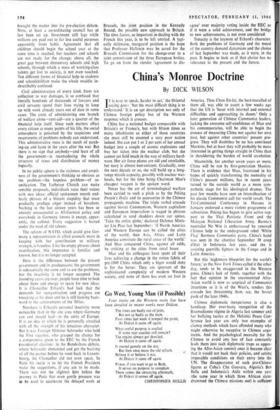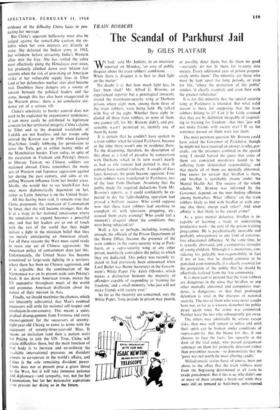China's Monroe Doctrine
By DICK WILSON TT is easy to speak, harder to act,' the Oriental 'saying goes : 'but the most difficult thing is to understand.' It is an apt description not only of Chinese foreign policy but of the Western response which it arouses.
China has a national budget comparable with Britain's or France's, but with fifteen times as many inhabitants as either of those countries she must still be counted a very poor nation indeed. She can put 1 or 2 per cent of her annual budget into a couple of atomic explosions and buy her ticket into the nuclear club, but she cannot yet field much in the way of military hard- ware. Her air force planes are old and unreliable, her navy is almost non-existent. Gradually, over the next decade or so, she will build up a long- range missile capacity, possibly with nuclear war- heads, but for the time being Chairman Mao's cheapest weapon is the spoken word.
Never has the art of terminological warfare been carried to -such a pitch as by the Peking Peoples Daily and its accessories in the Chinese propaganda machine. The triple verbal crusade against Soviet Communism, Western capitalism and European imperialism is waged in phrases calculated to send shudders down our spines. `Take the entire globe,' declared Defence Minis- ter Lin Piao last September : 'if North America and Western Europe can be called the cities of the world, then Asia, Africa and Latin America constitute the rural areas of the world.' And Mao conquered China, against all odds, by striking at the cities from rural bases.
Mao and his colleagues have spent all their lives achieving a change in the rotten fabric of pre-1949 China which only a bigot would deny is for the better. They are ignorant of the sophisticated complexity of modern Western society, and none of them has even set foot in
America. Thus Chou En-lai, the best-travelled of them all, was able to assert a few weeks ago that the US is 'beset with internal and external difficulties and approaching its doom.' Only a later. generation of Chinese Communist leaders, lacking the awesome self-confidence of Mao and his contemporaries, will be able to begin the process of measuring China not against her own past, but against other countries' present pro- gress. They will doubtless be no less convinced Marxists, but at least they will probably be more interested in getting things straight in China than in shouldering the burden of world revolution.
Meanwhile, for another seven years or more, China will be run by first-generation Maoists. There is evidence that Mao, frustrated in his hopes of quickly transforming the mentality of China's peasant millions, has in recent years turned to the outside world as a more sym- pathetic stage for his ideological dramas. The past few months have seen an intensification of his classic Communist call for world revolt. The Tri-Continental Conference in Havana in January endorsed a more violent programme of subversion. Peking has begun to give active sup- port to the Thai Patriotic Front and the Malayan National Liberation Army. Burma's neutralist Ne Win is embarrassed by renewed Chinese help to the underground rebel 'White Flag' Burmese Communist party. China's hand was seen in the abortive September 30 coup d'etat in Indonesia last year, and she is assisting guerrilla fighters in the Congo and in Latin America.
But this 'nightmare blueprint for the world's future,' as the New York Times called it the other day, tends to be exaggerated in the Western press. China's lack of funds, together with the fact that opinion in the uncommitted Afro- Asian world is now as sceptical of Communist intentions as it is of the West's, renders this crusade less threatening than, say, the Soviet push of the later 1940s. - Chinese diplomatic inexperience is also a handicap. Her over-hasty recognition of the Boumedienne regime in Algeria last summer and her bullying tactics at the Helsinki Peace Con- ference last year are only two - examples of clumsy methods which have offended many who might otherwise be receptive to Chinese argu- ments. And the psychological necessity for the Chinese to avoid any loss of face constantly leads them into such diplomatic traps as oppos- ing the Afro-Asian summit once it became clear that it would not back their policies, and setting impossible conditions on their entry into the UN. The disappearance of such pro-Chinese figures as Cuba's Che Guevara, Algeria's Ben Bella and Indonesia's Aidit within one year (the same year in which three African states drummed the Chinese missions out) is sufficient evidence of the difficulty China faces in pro- jecting her message.
But China's apparent bellicosity must also be judged against the remarkable caution she ex- hibits when her own interests are directly at stake. She defeated the Indian army in 1962, but withdrew before attracting India's Western allies into the fray. She has rattled the sabre most effectively along the Himalayas ever since, but prudently climbed down over Sikkim last autumn when the risk of provoking an American strike at her vulnerable supply lines in Tibet (and at her defenceless nuclear sites also) became real. Doubtless these dangers are a source of tension between the political leaders and the army, though this has also been exaggerated in the Western press: there is no conclusive evi- dence yet of a serious rift.
China's sensitivity to border control does not need to be explained by expansionist tendencies; it can more easily be attributed to legitimate concern for her territorial integrity. China's claims to Tibet and to the disputed wastelands of Ladakh are not baseless, and her troops only entered the Korean war in 1950 when General MacArthur, loudly lobbying for permission to cross the Yalu, got to within twenty miles of the Manchurian border. Even today, in spite of the escalation in Vietnam and Peking's threats to liberate Taiwan, no Chinese soldiers are stationed abroad. China remembers the many acts of Western and Japanese aggression against her during the past century, and aims at ex- pelling Western influence from her border areas. Ideally, she would like to see South-East Asia once more diplomatically dependent on her, rather as Latin America is on the United States.
All this having been said, it remains true that China propounds the extension of Communism by force, that she will become stronger, that she is at a stage in her national renaissance where the temptation to expand becomes a powerful one, and that her leaders are so out of touch with the rest of the world that they might initiate a fight in the mistaken belief that they are merely anticipating an American attack. For all these reasons the West must stand ready to resist any act of Chinese aggression: the American policy of containment does just this. Unfortunately, the United States has become committed to large-scale fighting in a territory where there has been no Chinese aggression, and it is arguable that the continuation of the Vietnamese war on its present scale suits Peking's book. It ties down American troops, makes the US unpopular throughout much of the world and promotes American disillusion about the nature of their mission in Asia.
Finally, we should maximise the chances, which are inherently substantial, that Mao's eventual successors will settle for national self-respect and revolution-in-one-country. This means a quiet, gradual disengagement from Formosa and every encouragement for the successors of seventy- eight-year-old Chiang to come to terms with the successors of seventy-three-year-old. Mao. It means an invitation (and then a patient wait) for Peking to join the UN. True, China will create difficulties there, but the main function of that body is to increase and co-ordinate the available international pressures on dissident Powers to co-operate in the world's affairs, and China is the sole remaining dissident power. China does not at present pose a grave threat to the West, but it will take immense patience and diplomacy—and sympathy, too, not for her Communism, but for her nationalist aspirations —to prevent her doing so in the future.



































 Previous page
Previous page